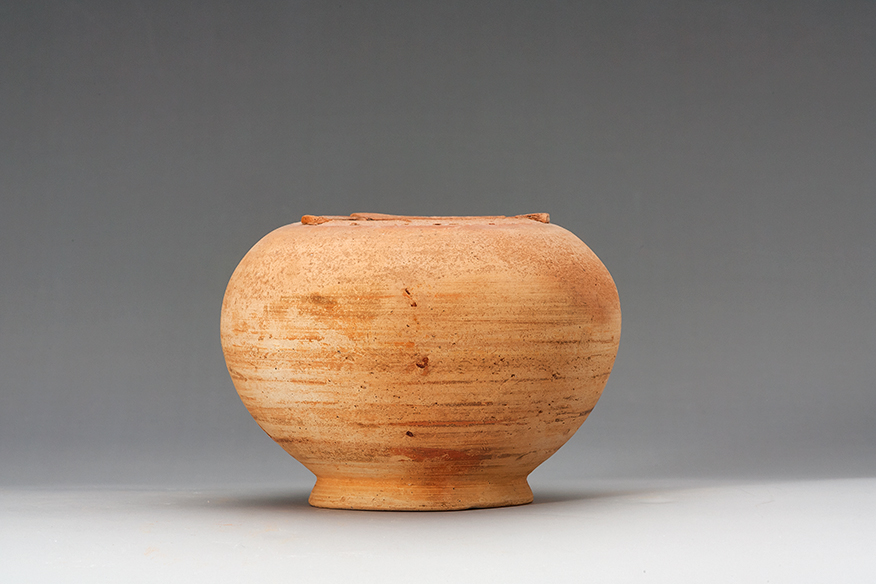Acquisition number: 1966.09
Convex-sided pyxis without handles. A fragment of the upper wall has been broken and re-joined; much of the rim is missing. The surface is worn. Rough cream-buff clay; red-brown paint. The rim is painted solid. The body is decorated with bands but the lower wall and foot are painted solid. The underside is reserved.
Title: Pyxis - 1966.09
Acquisition number: 1966.09
Acquisition source or name: Woite Collection.
Acquisition year: 1966
Owner type: ANU Classics Museum
Author or editor: J.R. Green
Culture or period: Sicilian Black, Banded and Plain.
Date: Mid 6th century BC.
Date century or Timeline (notional): 599 to 500
Material: Clay - Terracotta
Object type: Pyxis
Technique or style: Vessels - cylindrical box.
Dimensions: 143mm (w) × 103mm (h)
Origin region or location: Italy
Origin city: Possibly Gela.
Display case or on loan: 10
Keywords: Sicilian, Woite Collection
J.R. Green with B. Rawson, Catalogue of Antiquities in the Australian National University, A.N.U. (Canberra, 1981) 73.
1966.09
Pyxis
From the Woite Collection; probably from the area of Gela, Sicily. Ht 10.3cm; diam. 14.3cm.
Convex-sided pyxis without handles. A fragment of the upper wall has been broken and re-joined; much of the rim is missing. The surface is worn. Rough cream-buff clay; red-brown paint. The rim is painted solid. The body is decorated with bands but the lower wall and foot are painted solid. The underside is reserved.
This type of pyxis first appears in Corinthian pottery in the earlier part of the sixth century decorated in the usual Corinthian animal style. In Late Corinthian I towards the middle of the century it is more often decorated with bands, and it is that version which is imitated in our vase. See H. Payne, Necrocorinthia (Oxford 1931) 305 and 322. The shape is taken up in a slightly modified version in Athens in the fifth century where it seems to be associated with women and could be used as a wedding gift.
Sicilian imitation of Corinthian; middle of the sixth century BC.
See 1966.01-1966.42 in this catalogue for all material from the Woite Collection in the ANU collection.
J.R. Green with B. Rawson, Catalogue of Antiquities in the Australian National University, A.N.U. (Canberra, 1981) 73.
1966.09
Pyxis
With lid and handles missing
This Sicilian container imitates Corinthian ware in shape and decoration.
Mid-6th century BC
From the Woite Collection.
Convex-sided pyxis without handles. A fragment of the upper wall has been broken and re-joined; much of the rim is missing. The surface is worn.
